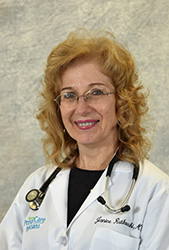Category Archives: Health & Wellness
Holidays Got You Anxious?
by Janice Rutkowski, M.D.
During the holidays, many people look forward to spending time with friends and family, but there is also a great deal of anxiety associated with various preparations, travel and time commitments. There may be an inability to sleep properly, exercise wanes and diets can be abandoned. How do we decide if this is “normal” stress from the holidays or is there more involved?
There are many kinds of anxiety disorders and these may have to be treated differently depending on the cause and symptoms. These include generalized anxiety disorder, panic disorder, obsessive-compulsive disorder, post-traumatic stress disorder, and social phobia. Modalities of treatment may include medication and/or counseling. Your physician should be able to diagnose the condition and determine appropriate treatment.
When should you seek medical help? If the level of anxiety is interfering with your day-to-day activities, the symptoms have been present for over 2 weeks, symptoms are worsening over time or interpersonal relationships are suffering as a result, you should make an appointment with your doctor to discuss therapeutic options.
A Healthier Weight: 3 Key Steps
 Q & A with Dr. Falana Carter of MPCP, Arundel Mills
Q & A with Dr. Falana Carter of MPCP, Arundel Mills
Q: What are the key challenges for patients who struggle with weight?
A: Given the demands of family, career, and social responsibilities, it’s no wonder many people find that their health is pushed to the end of the priority list. I tell patients who struggle with obesity that there are 3 simple steps to improve their cardiac health, lower cholesterol, and reduce BMI (Body Mass Index) through lifestyle changes:
-
- Eat 3-4 meals daily – don’t skip any meals! When you skip a meal, you slow your metabolism down – your body needs to eat every 4-6 hours.
- Exercise – schedule it into your daily routine.
- Be “selfish” for your health.
Q: How do you start the conversation with patients who need to lose weight?
A: As part of their exam, I ask, “So what are you doing for exercise?” Often patients tell me they don’t have time to exercise; this is where I encourage them to be selfish. If you set aside a regular time to exercise, and let your family and friends know, they’ll respect that schedule and not distract you from your goal.
Q: In addition to eating on a regular schedule, how big a part does nutrition play?
A: Nutrition plays a central role. I emphasize the importance of eating healthy – more protein, healthy snacks; less sugar and processed foods. I also recommend using myfitnesspal.com, a free online weight loss tool. And for patients willing to share their password, there’s even the capability for their doctor to see what they’re eating, and provide feedback and guidance in their weight loss process.
Q: How are you incorporating these principles into your practice
A: Soon, the Arundel Mills office will launch a program dedicated to improving patients’ health through lifestyle changes, so we’re excited about this opportunity to help more individuals achieve their goals.
Falana P. Carter, M.D. joined Maryland Primary Care Physicians, Arundel Mills in 2011 and is certified by the American Board of Family Physicians. She received her medical degree from University of South Florida College of Medicine in 2001 and completed her residency program in Family Medicine at Portsmouth Family Medicine, Eastern Virginia Medical School in 2004.
ADD in Adults
by Janice Rutkowski, M.D.
 ADD & ADHD* are similar disorders that often first present in childhood, but can extend into adulthood as well. It is estimated that a full third of children with ADD will continue to be affected later in life. Since this disorder was not well understood in the past, many individuals were un-diagnosed. But the onset of the internet and better understanding of disordered human behavior, have helped many patients realize they may have a problem.
ADD & ADHD* are similar disorders that often first present in childhood, but can extend into adulthood as well. It is estimated that a full third of children with ADD will continue to be affected later in life. Since this disorder was not well understood in the past, many individuals were un-diagnosed. But the onset of the internet and better understanding of disordered human behavior, have helped many patients realize they may have a problem.
Most adults with ADD find they have difficulty with organization and planning, are easily distracted, feel a sense of restlessness or anxiety, and lack ability to resist impulses to stray from a task or project. Unfortunately, this inability to stay on task can lead to problems at school, in the workplace, and in personal relationships. Serious consequences such as divorce, job loss and substance abuse can be more common for those with ADD/ADHD.
However, there are several treatment options to help! The first step is talking with your doctor. While there is no one test to diagnose the condition, detailed information from the patient and sometimes family members can be very useful. A physical, including blood work and an EKG, should be done to ensure there are no other health issues causing the symptoms.
Treatment is usually very effective with a combination of diet, behavioral therapy and stimulant drugs, such as Adderall or Ritalin. There are many newer medications as well and your doctor will work with you to find the most effective. Some drugs come in extended-release form so you do not have to take multiple doses during the day, and some non-stimulant drugs are also available. Side effects may include sleeplessness, loss of appetite, mood changes or heart rhythm abnormalities. But most patients tolerate the therapy quite well and are amazed at the difference in their work and home life.
So, please talk with your doctor if you are concerned you might have ADD or ADHD- or the symptoms- so you can work together to treat it effectively.
*ADD stands for Attention Deficit Disorder. ADHD is Attention Deficit Hyperactivity Disorder.
New Test Identifies Heart & Stroke Risk Earlier
MPCP Cardiologist, Dr. David Kim Explains CIMT
We’ve made great strides in understanding the risk factors for heart disease and stroke. And we try to prevent them by eating well, exercising, controlling our blood pressure and cholesterol and avoiding bad habits, like smoking. But many people still suffer heart attacks and strokes despite these efforts. What if there was a way to identify a person’s risk earlier- and non-invasively? A new testing method, called Carotid Intima-Media Thickness- or CIMT- is doing just that.
CIMT testing utilizes ultrasound to examine the inner lining (i.e., Intima and Media layers) of the carotid arteries in your neck. These layers are known to gradually thicken over the years as part of the normal aging process. But if this thickening is accelerated, it suggests that that person may be at higher risk of eventually developing full atherosclerosis (“hardening of the arteries”) –the step that often leads to a heart attack or stroke. Indeed, multiple research studies have shown that premature intima-media thickening identifies those at a higher risk for a cardiac event even more than previously thought. Knowing your CIMT may be very useful in formulating a more precise strategy of prevention that is targeted for you.
CIMT testing is most appropriate for individuals between 40 and 70 years old, especially in those with a history of smoking, diabetes, high cholesterol, high blood pressure, or family history of heart disease. This test is NOT recommended if you already have a history of coronary artery disease (such as previous heart attack, bypass surgery, or heart angioplasty/stent), previous stroke, or known peripheral arterial disease.
CIMT testing is quick (about 20 minutes), non-invasive and pain-free. Because it uses ultrasound technology, there is no exposure to any harmful radiation. No special preparation is needed.
CIMT testing is available at our MPCP Columbia Cardiology practice. It costs $99 and is not covered by insurance. After the completion of the study, a result report with detailed explanation will be mailed to you and your health care provider(s). Your CIMT result can then be used in conjunction with known cardiovascular risk factors to more precisely assess your risk of future cardiovascular events.
If you have any questions, or would like to make an appointment, please contact the Columbia Cardiology office at 410-740-0789 or visit our site page.
 Dr. Jackson is a Maryland Primary Care Physicians, LLC partner and is certified by the American Board of Internal Medicine in both Cardiovascular and Internal Medicine. Dr. Jackson is a graduate of Harvard College in Cambridge, MA. He received his medical degree from Mount Sinai School of Medicine in 1980 and completed his residency program in Internal Medicine at St. Luke’s Roosevelt Hospital Center in 1983. Dr. Jackson completed his cardiology fellowship at Norwalk Hospital, an affiliate of Yale University School of Medicine, in 1985.
Dr. Jackson is a Maryland Primary Care Physicians, LLC partner and is certified by the American Board of Internal Medicine in both Cardiovascular and Internal Medicine. Dr. Jackson is a graduate of Harvard College in Cambridge, MA. He received his medical degree from Mount Sinai School of Medicine in 1980 and completed his residency program in Internal Medicine at St. Luke’s Roosevelt Hospital Center in 1983. Dr. Jackson completed his cardiology fellowship at Norwalk Hospital, an affiliate of Yale University School of Medicine, in 1985.
 Dr. Kim joined Maryland Primary Care Physicians, LLC in 2012 and is certified by the American Board of Internal Medicine in both Cardiovascular and Internal Medicine. Dr. Kim is a graduate of Duke University. He received his medical degree from State University of New York at Buffalo School of Medicine in 2002 and completed his residency program in Internal Medicine at Washington University School of Medicine in 2005. Dr. Kim completed his cardiology fellowship at the University of Rochester School of Medicine & Dentistry in 2008.
Dr. Kim joined Maryland Primary Care Physicians, LLC in 2012 and is certified by the American Board of Internal Medicine in both Cardiovascular and Internal Medicine. Dr. Kim is a graduate of Duke University. He received his medical degree from State University of New York at Buffalo School of Medicine in 2002 and completed his residency program in Internal Medicine at Washington University School of Medicine in 2005. Dr. Kim completed his cardiology fellowship at the University of Rochester School of Medicine & Dentistry in 2008.



